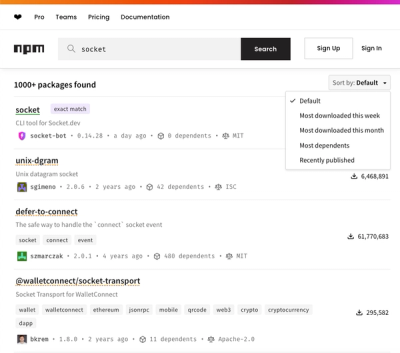
Security News
npm Updates Search Experience with New Objective Sorting Options
npm has a revamped search experience with new, more transparent sorting options—Relevance, Downloads, Dependents, and Publish Date.
@travetto/transformer
Advanced tools
Functionality for AST transformations, with transformer registration, and general utils
Install: @travetto/transformer
npm install @travetto/transformer
# or
yarn add @travetto/transformer
This module provides support for enhanced AST transformations, and declarative transformer registration, with common patterns to support all the transformers used throughout the framework. Transformations are located by support/transformer.<name>.ts as the filename.
The module is primarily aimed at extremely advanced usages for things that cannot be detected at runtime. The Registry module already has knowledge of all classes and fields, and is able to listen to changes there. Many of the modules build upon work by some of the foundational transformers defined in Manifest, Registry, Schema and Dependency Injection. These all center around defining a registry of classes, and associated type information.
Because working with the Typescript API can be delicate (and open to breaking changes), creating new transformers should be done cautiously.
Within the framework, any build or compile step will target the entire workspace, and for mono-repo projects, will include all modules. The optimization this provides is great, but comes with a strict requirement that all compilation processes need to be idempotent. This means that compiling a module directly, versus as a dependency should always produce the same output. This produces a requirement that all transformers are opt-in by the source code, and which transformers are needed in a file should be code-evident. This also means that no transformers are optional, as that could produce different output depending on the dependency graph for a given module.
Below is an example of a transformer that upper cases all class, method and param declarations. This will break any code that depends upon it as we are redefining all the identifiers at compile time.
Code: Sample Transformer - Upper case all declarations
import ts from 'typescript';
import { OnProperty, TransformerState, OnMethod, OnClass } from '@travetto/transformer';
export class MakeUpper {
@OnProperty()
static handleProperty(state: TransformerState, node: ts.PropertyDeclaration): ts.PropertyDeclaration {
if (!state.importName.startsWith('@travetto/transformer/doc/upper')) {
return node;
}
return state.factory.updatePropertyDeclaration(
node,
node.modifiers,
node.name.getText().toUpperCase(),
undefined,
node.type,
node.initializer ?? state.createIdentifier('undefined')
);
}
@OnClass()
static handleClass(state: TransformerState, node: ts.ClassDeclaration): ts.ClassDeclaration {
if (!state.importName.startsWith('@travetto/transformer/doc/upper')) {
return node;
}
return state.factory.updateClassDeclaration(
node,
node.modifiers,
state.createIdentifier(node.name!.getText().toUpperCase()),
node.typeParameters,
node.heritageClauses,
node.members
);
}
@OnMethod()
static handleMethod(state: TransformerState, node: ts.MethodDeclaration): ts.MethodDeclaration {
if (!state.importName.startsWith('@travetto/transformer/doc/upper')) {
return node;
}
return state.factory.updateMethodDeclaration(
node,
node.modifiers,
undefined,
state.createIdentifier(node.name.getText().toUpperCase()),
undefined,
node.typeParameters,
node.parameters,
node.type,
node.body
);
}
}
Note: This should be a strong indicator that it is very easy to break code in unexpected ways.
Code: Sample Input
export class Test {
name: string;
age: number;
dob: Date;
computeAge(): void {
this['age'] = (Date.now() - this.dob.getTime());
}
}
Code: Sample Output
"use strict";
Object.defineProperty(exports, "__esModule", { value: true });
exports.TEST = void 0;
const tslib_1 = require("tslib");
const Ⲑ_root_index_1 = tslib_1.__importStar(require("@travetto/manifest/src/root-index.js"));
const Ⲑ_decorator_1 = tslib_1.__importStar(require("@travetto/registry/src/decorator.js"));
var ᚕf = "@travetto/transformer/doc/upper.js";
let TEST = class TEST {
static Ⲑinit = Ⲑ_root_index_1.RootIndex.registerFunction(TEST, ᚕf, 649563175, { COMPUTEAGE: { hash: 1286718349 } }, false, false);
NAME;
AGE;
DOB;
COMPUTEAGE() {
this['AGE'] = (Date.now() - this.DOB.getTime());
}
};
TEST = tslib_1.__decorate([
Ⲑ_decorator_1.Register()
], TEST);
exports.TEST = TEST;
FAQs
Functionality for AST transformations, with transformer registration, and general utils
The npm package @travetto/transformer receives a total of 6 weekly downloads. As such, @travetto/transformer popularity was classified as not popular.
We found that @travetto/transformer demonstrated a healthy version release cadence and project activity because the last version was released less than a year ago. It has 0 open source maintainers collaborating on the project.
Did you know?

Socket for GitHub automatically highlights issues in each pull request and monitors the health of all your open source dependencies. Discover the contents of your packages and block harmful activity before you install or update your dependencies.

Security News
npm has a revamped search experience with new, more transparent sorting options—Relevance, Downloads, Dependents, and Publish Date.

Security News
A supply chain attack has been detected in versions 1.95.6 and 1.95.7 of the popular @solana/web3.js library.

Research
Security News
A malicious npm package targets Solana developers, rerouting funds in 2% of transactions to a hardcoded address.